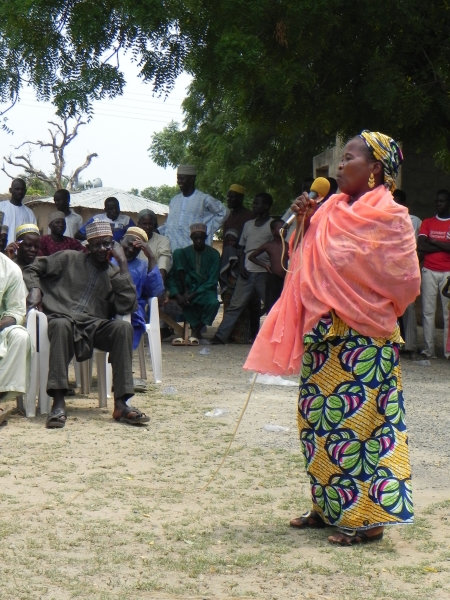Bauchi, Nigeria—When the tiny community of Warji in Bauchi State in northeastern Nigeria needed someone to lead their fight against malaria, they chose two farming neighbors, Salamatu Mohammed and Sadiq Baba Wakasau. Both volunteered their time and meager resources to save the lives of fellow farmers, pregnant women and children—all 224 of them.
As part of a malaria prevention and treatment program sponsored by the Bauchi State Agency for the Control of HIV/AIDS, Tuberculosis, Leprosy and Malaria (BACATMA), Salamatu and Sadiq and dozens of others were recruited to work with the local health services to promote anti-malaria activities. As community-oriented resource persons, the volunteers mobilize their fellow citizens to participate in evidence-based case management of malaria, promote use of insecticide-treated nets and intermittent preventive treatment, and access prenatal care services through community referral.
In the past, Jhpiego, in collaboration with the government and the ExxonMobil Foundation, has helped prevent malaria in Nigeria through a multi-year program that targeted pregnant women in four areas in Akwa Ibom State. As part of its mission to prevent the needless deaths of women and families, Jhpiego provided more than 26,000 pregnant women with two doses of intermittent preventive treatment of malaria, and 5,000 pregnant women received insecticide-treated mosquito nets.
In Warji, rains soak the farmland for four months of the year, leaving residents vulnerable to malaria transmission year round. For the month of June 2012, the state agency monitoring malaria control in Bauchi State reported a total of 44,666 cases of fever. BACATMA, with the support of Jhpiego, the Innovative Consultancy & Agricultural Services and the National Malaria Control Program under the World Bank-assisted Malaria Booster Program, sponsored a series of activities to involve the community in malaria prevention. A key aspect of the program is to have community volunteers take charge of the distribution of health commodities under the supervision of the health services.
Honored to be chosen as community volunteers, Salamatu and Sadiq participated in a five-day training on home management of malaria using artemisinin-based combination therapy (ACT) regimens (the first line of treatment against malaria infection), counseling on drug compliance and adverse reaction, benefits of prenatal care attendance and community health education.
“This training is indeed enabling and an eye opener…. Thank God for this opportunity to be among the select few. I will not disappoint,” said Salamatu.
Such enthusiasm is what makes the community volunteers such a force in this fight. In five months, they have cumulatively reached more than 300 pregnant women with community health education on malaria prevention, treated 50 under-five children with oral rehydration salts for diarrhea and dewormed 725 school children.
But challenges remain. Eight months after community volunteers Salamatu and Sadiq finished their training, the number of available ACT doses could not meet the need for them. Although 1,537,360 doses were required for the whole state, the National Malaria Control Program was able to procure and distribute to health facilities only 384,340 (25 percent) because of logistical issues.
Sadiq, however, is not deterred in his resolve to save the lives of pregnant women and children in his district. “If the ACTs promised are supplied as we have been told, I can assure you that malaria will no longer be a problem to my community,” he said.





